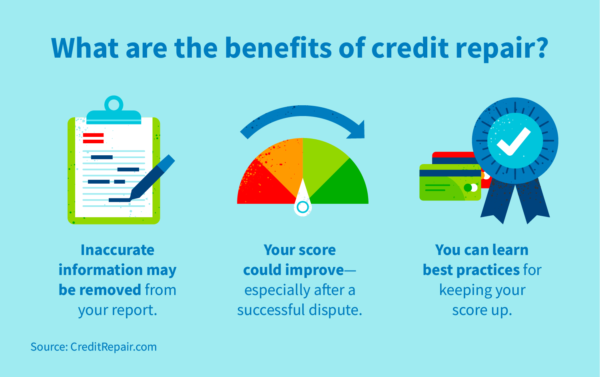Have you ever wondered what credit repair truly means? In simple terms, credit repair is the process of improving your creditworthiness by addressing any negative elements on your credit report. This article will provide you with a clear understanding of what exactly credit repair entails, and how it can potentially benefit you in achieving your financial goals. So, let’s unravel the mystery behind credit repair and discover how it can help you shape a brighter financial future.
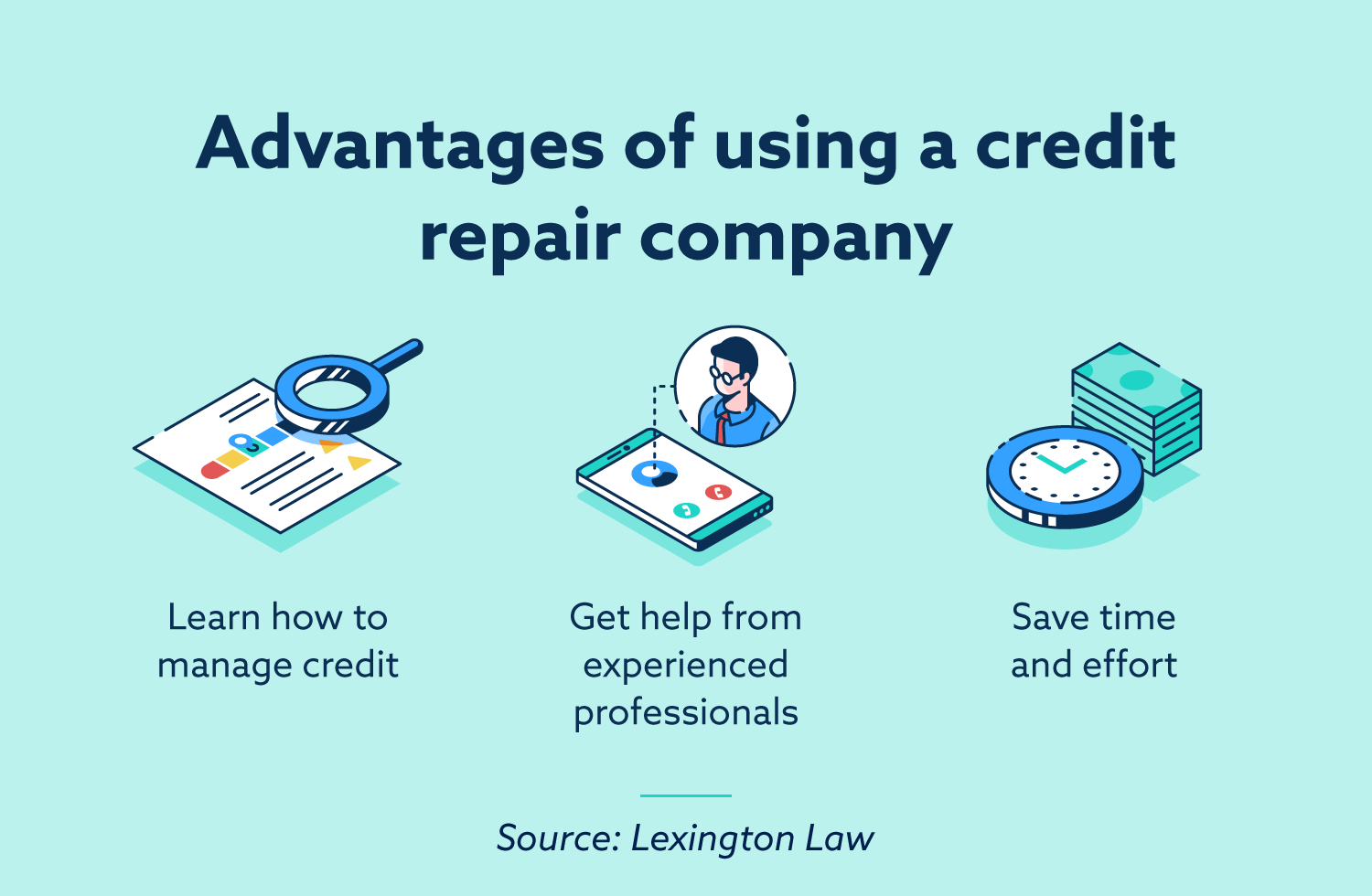
Understanding the Basics of Credit Repair
Definition of Credit Repair
Credit repair is the process of improving and fixing one’s credit history. It involves taking steps to address and resolve negative items, errors, and inaccuracies that may be present on your credit report. The main goal of credit repair is to enhance your creditworthiness and increase your chances of qualifying for loans, credit cards, and other financial opportunities.
How Credit Repair Works
Credit repair typically starts by obtaining a copy of your credit report from the major credit bureaus. This report outlines your payment history, credit accounts, inquiries, and other relevant information. Once you have your credit report, you can review it for any errors or discrepancies that may be negatively impacting your credit score.
To begin the repair process, you will need to contact the credit bureaus and dispute any inaccurate information you have found. The credit bureaus then have 30 days to investigate your dispute and either remove the disputed item or provide evidence supporting its accuracy. If the item is removed, your credit score could see an improvement. However, keep in mind that not all disputations will result in a removal, as the credit bureaus need to verify the information provided.
Importance of Credit Repair
Credit repair is essential for several reasons. Firstly, it enables you to improve your credit score, which is a crucial factor in determining your creditworthiness. A higher credit score increases your chances of approval for loans, credit cards, and favorable interest rates. Additionally, credit repair allows you to correct inaccurate information that may be misrepresented on your credit report.
Having a good credit score is important not only when you’re seeking to borrow money but also in various other aspects of life. Landlords, insurance companies, and even some employers may evaluate your credit history to make decisions about renting a property, providing insurance coverage, or offering job opportunities. By engaging in credit repair, you can ensure that your credit history accurately reflects your financial responsibility.
Common Credit Issues that Require Repair
Late Payments
Late payments can have a significant negative impact on your credit score. If you fail to make your payments on time, your creditors may report these late payments to the credit bureaus, which will be reflected on your credit report. Credit repair can address late payments by disputing any inaccuracies or errors related to these late payments and working towards having them removed from your credit history.
Charge-offs
A charge-off occurs when a creditor writes off a debt as a loss because it has been delinquent for an extended period, typically 180 days or more. A charge-off is a severe negative mark on your credit report and can greatly impact your credit score. Credit repair can assist in addressing charge-offs by disputing any inaccuracies, negotiating with the creditor to settle the debt, or establishing a payment plan to resolve the outstanding balance.
Foreclosures
Foreclosures occur when a homeowner fails to make mortgage payments, leading the lender to seize and sell the property. A foreclosure can have a devastating effect on your credit score and may hinder your ability to obtain future credit. Credit repair can help mitigate the impact of a foreclosure by ensuring that all information on your credit report is accurate and up-to-date. Additionally, credit repair can assist in negotiating with creditors and finding solutions to resolve the foreclosure.
Bankruptcies
Bankruptcy is a legal process where individuals or businesses can seek relief from their debts. While bankruptcy has a severe impact on your credit score, credit repair can be instrumental in helping you rebuild your credit after bankruptcy. By addressing any inaccuracies and implementing good credit practices, credit repair offers the opportunity to improve your creditworthiness over time, even after the challenges associated with bankruptcy.
The Role of Credit Bureaus in Credit Repair
What Are Credit Bureaus
Credit bureaus, also known as credit reporting agencies, are companies that gather and store information about individuals’ credit histories. The three major credit bureaus in the United States are Equifax, Experian, and TransUnion. These organizations collect data from various sources, including lenders, creditors, and public records, to create credit reports that detail individuals’ credit behaviors and payment histories.
How Credit Bureaus Impact Your Credit Score
Credit bureaus play a crucial role in determining your credit score. They use the information provided by creditors and lenders to calculate your score using specific algorithms. The credit bureaus consider factors such as payment history, credit utilization, length of credit history, new credit accounts, and the types of credit you have utilized. These factors collectively determine your creditworthiness and overall credit score.
Working with Credit Bureaus During the Repair Process
When engaging in credit repair, it is necessary to work with the credit bureaus to address any inaccuracies or errors within your credit report. You can begin the process by obtaining a copy of your credit report from each of the three major credit bureaus. Review the reports carefully, and if you identify any inaccuracies, you can dispute them directly with the credit bureaus.
During the dispute process, the credit bureaus have 30 days to investigate and respond to your dispute. They will reach out to the lenders or creditors involved to verify the accuracy of the reported information. If the disputed item is found to be incorrect or unverifiable, the credit bureaus will remove it from your credit report. Keeping an open line of communication with the credit bureaus throughout the repair process is crucial for effectively improving your credit history.
Understanding Your Rights in Credit Repair
Credit Repair Organizations Act
The Credit Repair Organizations Act (CROA) is a federal law that regulates credit repair companies to protect consumers. Under this act, credit repair organizations must provide consumers with certain rights and disclosures. These include providing a written contract, disclosing the right to cancel services within three days, and prohibiting false or misleading claims about their services or results.
Fair Credit Reporting Act
The Fair Credit Reporting Act (FCRA) is a federal law that regulates the collection, accuracy, and use of consumer credit information by credit reporting agencies. It grants consumers specific rights, such as the right to access their credit reports, dispute inaccurate information, and be notified if adverse action is taken against them based on their credit report. The FCRA aims to ensure fair and accurate reporting of credit information.
Fair Debt Collection Practices Act
The Fair Debt Collection Practices Act (FDCPA) is a federal law that protects consumers from abusive and unfair debt collection practices. The act outlines rules and guidelines for debt collectors, including when and how they can contact consumers, what information they can disclose, and what actions they can take to collect debts. Knowing and understanding your rights under the FDCPA can help you effectively navigate interactions with debt collectors during the credit repair process.
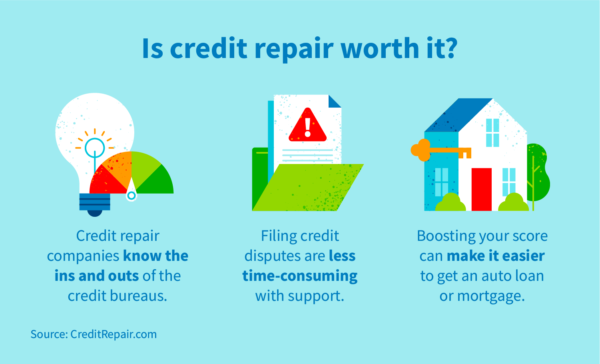
Do-It-Yourself Credit Repair
Steps for DIY Credit Repair
If you choose to pursue credit repair on your own, there are several steps you can take to improve your credit history.
- Obtain and review your credit reports from all three major credit bureaus.
- Identify any errors or inaccuracies within the reports.
- Dispute the inaccuracies with the credit bureaus by submitting a formal dispute letter.
- Follow up with the credit bureaus and keep detailed records of all correspondence.
- Implement good credit habits, such as making payments on time, reducing credit utilization, and avoiding excessive new credit applications.
- Regularly monitor your credit reports to ensure accuracy and track improvements over time.
Key Skills for Successful DIY Credit Repair
Embarking on the journey of DIY credit repair requires certain skills and knowledge. These include:
- Attention to detail: You must meticulously review your credit reports to identify any errors or discrepancies that may be negatively affecting your credit score.
- Patience and persistence: The credit repair process can take time, and it requires perseverance to see it through to the end.
- Organization: Keeping track of your correspondence with the credit bureaus and creditors is crucial for effectively disputing inaccurate information.
- Financial management: Knowing how to manage your finances, including making timely payments and reducing credit utilization, is essential for successful credit repair.
Potential Challenges in DIY Credit Repair
While DIY credit repair can be a viable option for some, there are several potential challenges that individuals may face. These include:
- Lack of expertise: Understanding the various laws, regulations, and credit scoring models can be complex and overwhelming for those without experience in credit repair.
- Time-consuming process: Credit repair requires thorough research, documentation, and follow-up with credit bureaus and creditors, which can be time-consuming for individuals who have other commitments.
- Emotional impact: Dealing with negative and inaccurate information on your credit report can be emotionally challenging. It is important to approach the process with a positive mindset and seek support if needed.
- Limited resources: DIY credit repair may not have access to the same tools, resources, and industry connections as professional credit repair services.
Professional Credit Repair Services
How Professional Credit Repair Works
Professional Credit Repair Services offer expertise and assistance in improving your credit history. These services typically involve the following steps:
- Consultation: A credit repair professional will review your credit reports, assess your financial situation, and provide personalized advice tailored to your needs.
- Dispute process: The credit repair company will handle the dispute process on your behalf, contacting the credit bureaus and lenders to address inaccuracies and negotiate the removal of negative items.
- Credit monitoring: Many professional services offer credit monitoring tools that allow you to track changes to your credit reports and stay updated on your credit health.
- Credit education: Professional credit repair services often provide resources and guidance to help you understand credit-related topics, improve your financial literacy, and make informed decisions.
Choosing a Credit Repair Service
When selecting a professional credit repair service, it is crucial to do your research and consider the following factors:
- Reputation: Look for a reputable credit repair company with positive reviews and a track record of successfully helping clients improve their credit.
- Transparency: The company should be transparent about its pricing, services, and any potential limitations or guarantees.
- Accreditation and certification: Check if the credit repair service is accredited by reputable organizations or has certifications that demonstrate its expertise and adherence to industry standards.
- Commitment to compliance: Ensure that the company follows all applicable laws, such as the CROA and FCRA, to protect your rights as a consumer.
Advantages and Disadvantages of Using Professional Services
Using professional credit repair services can have both advantages and disadvantages. Some advantages include:
- Expertise and experience: Credit repair professionals have in-depth knowledge of credit laws, regulations, and industry practices, which can expedite the repair process and potentially yield better results.
- Time-saving: Outsourcing credit repair to professionals frees up your time and energy, allowing you to focus on other priorities in your life.
- Guidance and support: Professional services can provide personalized guidance, resources, and support to help you navigate the credit repair journey successfully.
However, there are also a few disadvantages to consider:
- Cost: Professional credit repair services often come with fees, which can vary depending on the company and the extent of repair needed.
- Lack of control: By relying on professionals, you may have less control over the credit repair process and the strategies employed to address inaccuracies on your credit report.
- Limited guarantees: While reputable credit repair services can offer some guarantees of improved credit, there is no guarantee that all negative items will be removed, or that the process will yield significant results.
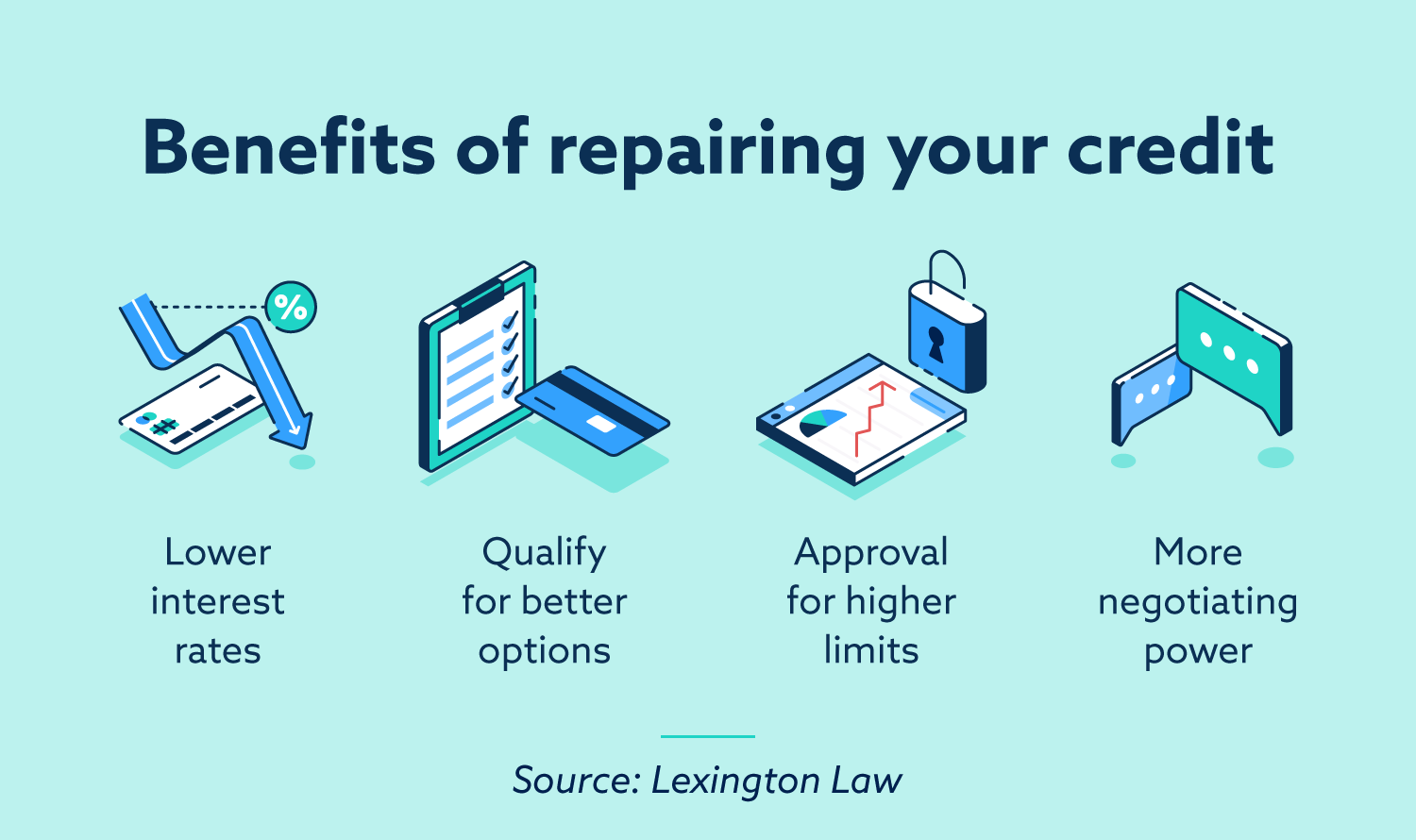
Dealing with Identity Theft and Fraud
How Identity Theft Affects Credit
Identity theft occurs when someone steals your personal information, such as your Social Security number or credit card details, and uses it to commit fraud. Identity theft can have severe consequences on your credit. Fraudulent accounts or unauthorized charges can appear on your credit report, damaging your credit score and making it difficult for you to obtain credit in the future.
How Credit Repair Can Help
If you have been a victim of identity theft, credit repair can play a vital role in restoring your credit. By working with credit bureaus and lenders, credit repair professionals can help dispute fraudulent accounts and incorrect information resulting from identity theft. Additionally, they can assist in placing fraud alerts on your credit reports and guide you through the steps necessary to recover your credit health.
Preventing Future Identity Theft and Fraud
While credit repair can address the consequences of identity theft, it is crucial to take steps to prevent future incidents. Here are some preventive measures to consider:
- Monitor your accounts: Regularly review your financial statements and credit reports to identify any suspicious activities or unauthorized transactions.
- Safeguard personal information: Keep your Social Security number, credit card details, and other personal information secure. Be cautious about sharing information online and take steps to protect your digital privacy.
- Shred sensitive documents: Properly dispose of financial statements, credit card offers, and other sensitive documents by shredding them before discarding.
- Use strong passwords: Create strong, unique passwords for your online accounts and regularly update them. Consider using password managers for added security.
- Be cautious of phishing scams: Be aware of emails, calls, or texts from individuals or organizations seeking personal information. Do not click on suspicious links or provide sensitive information unless you are certain of the source’s authenticity.
The Impact of Good Credit Health
Benefits of Good Credit Health
Maintaining good credit health brings numerous benefits and opportunities. These include:
- Lower interest rates: With a good credit score, you are likely to qualify for loans, credit cards, and mortgages with lower interest rates. This can potentially save you thousands of dollars in interest payments over time.
- Higher credit limits: Lenders are more likely to extend higher credit limits to individuals with good credit. This can provide greater financial flexibility and purchasing power.
- Better insurance rates: Insurance companies often consider credit scores when determining insurance rates. A good credit score can result in lower premiums for auto, home, and other types of insurance.
- Rental opportunities: Landlords often factor in credit histories when selecting tenants. A good credit history can increase your chances of securing desirable rental properties.
- Employment prospects: Some employers may review credit reports as part of the hiring process, particularly for positions that involve financial responsibility or access to sensitive information. Good credit health can positively impact your employability.
Achieving and Maintaining Good Credit Health
To achieve and maintain good credit health, it is important to follow certain practices:
- Make timely payments: Pay all bills and credit obligations on time to avoid late payments, which can negatively impact your credit score.
- Keep credit utilization low: Aim to keep your credit utilization ratio below 30%. This means using only a portion of your available credit to show responsible borrowing behavior.
- Build a positive credit history: Maintain a mix of different types of credit, such as credit cards, loans, and mortgages, and demonstrate consistent, responsible borrowing habits.
- Regularly check your credit reports: Review your credit reports at least annually to identify any errors or inaccuracies and address them promptly.
- Limit new credit applications: Excessive new credit applications can negatively impact your credit score, so only apply for credit when necessary.
- Resolve any outstanding debts: Pay off any outstanding debts or work with creditors to establish a manageable repayment plan.
- Be cautious with closing accounts: Closing old accounts may inadvertently lower your available credit, affecting your credit utilization ratio. Consult credit repair professionals or financial advisors before making such decisions to avoid unintended consequences.
Consequences of Poor Credit Health
Having poor credit health can lead to significant consequences that negatively impact your financial well-being:
- Limited access to credit: Individuals with poor credit may struggle to obtain loans, credit cards, or other forms of credit. If approved, they are likely to face higher interest rates and less favorable terms.
- Difficulty renting or buying a home: Landlords and mortgage lenders often require good credit histories as part of their screening process. Poor credit can limit your housing options or result in higher security deposits and interest rates.
- Higher insurance premiums: Insurance companies may view individuals with poor credit as higher-risk policyholders, resulting in higher insurance premiums.
- Employment challenges: Employers in certain industries may consider credit histories when making hiring decisions. Poor credit can hinder your chances of securing job opportunities, particularly those involving financial responsibility or positions in the public sector.
- Strained relationships: Poor credit health can cause stress and strain in personal relationships, particularly when it comes to joint financial decisions, shared responsibilities, or future plans that require good credit scores.
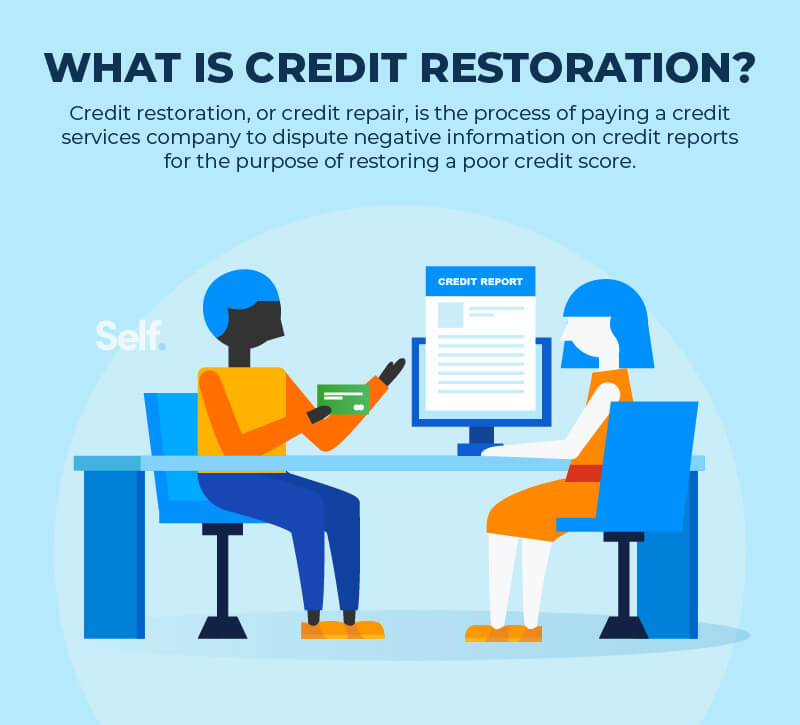
Factors Influencing Credit Score
Your credit score is influenced by various factors. Understanding these factors can help you make informed decisions to improve and maintain a healthy credit score:
Payment History
Payment history is one of the most significant factors affecting your credit score. It accounts for approximately 35% of your overall score. It reflects how consistently you make payments on time, including credit card bills, loan installments, and other credit obligations. Late payments, delinquencies, and defaults can significantly lower your credit score.
Credit Utilization Ratio
Credit utilization ratio refers to the percentage of your available credit that you have utilized. It affects approximately 30% of your credit score. To calculate this ratio, divide your total credit card balances by your total credit limits. Higher utilization ratios indicate a higher risk of overspending or relying heavily on credit, which can negatively impact your credit score.
Length of Credit History
The length of your credit history contributes to approximately 15% of your credit score. Lenders and creditors prefer longer credit histories as they provide a more comprehensive view of your financial behavior. A longer credit history with consistent, responsible credit use demonstrates a higher level of creditworthiness.
New Credit Accounts
Opening new credit accounts can impact approximately 10% of your credit score. Applying for multiple credit accounts within a short period raises concerns about your financial stability and suggests a higher risk of accumulating too much debt. Each credit application results in a hard inquiry on your credit report, temporarily lowering your credit score.
Types of Credit Used
The types of credit you have contribute to about 10% of your credit score. Lenders and creditors appreciate a diversified credit portfolio that demonstrates responsible management of various credit types. This can include credit cards, loans, mortgages, and retail credit accounts. A good mix of credit types indicates your ability to handle different financial obligations.
Common Misconceptions about Credit Repair
Quick Fix Promises
One common misconception about credit repair is the notion of quick fixes. Some companies or individuals may claim to provide instant improvements to your credit score or guarantee the removal of negative items. However, credit repair is a process that requires time, effort, and the cooperation of credit bureaus and lenders. Be cautious of any promises that sound too good to be true and seek reputable credit repair services that offer realistic expectations.
Paying Off Debts Immediately Improves Score
While paying off debts is a responsible financial practice, it does not necessarily guarantee an immediate improvement in your credit score. Negative items such as late payments or charge-offs may remain on your credit report for a specific period, even after the debt is satisfied. However, over time, paying off debts and consistently practicing good credit habits will positively impact your credit score.
Closing Old Accounts Helps Credit Score
Closing old credit accounts can actually harm your credit score in some cases. Length of credit history and credit utilization ratio are crucial factors in determining creditworthiness. Closing an old account reduces your total available credit, potentially increasing your credit utilization ratio. Additionally, closing an account can shorten your credit history, which may negatively affect your credit score. It is advisable to consult credit repair professionals or financial advisors before making the decision to close accounts.
You Can’t Repair Credit Yourself
Another misconception is that individuals cannot repair their own credit and must rely on professional services. While credit repair professionals offer expertise and support, it is possible to repair your credit independently. With the right knowledge, resources, and commitment, you can dispute inaccuracies, establish positive credit habits, and see improvements in your credit health. However, for complex credit situations or when specific expertise is required, professional assistance can be beneficial.
